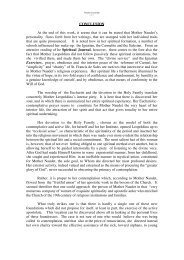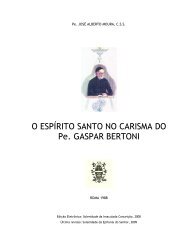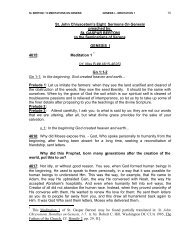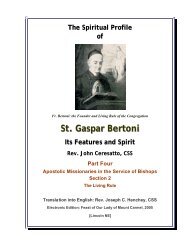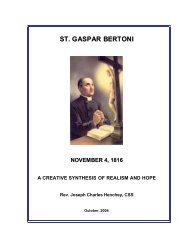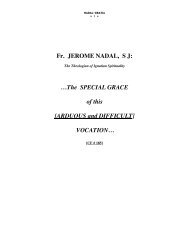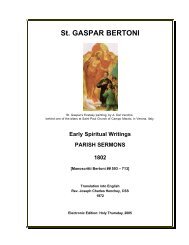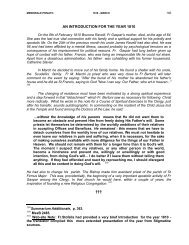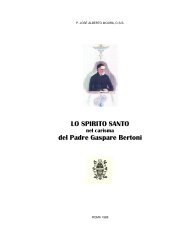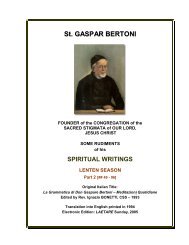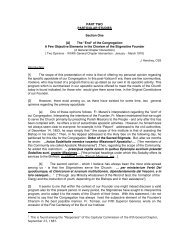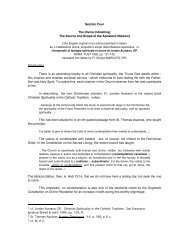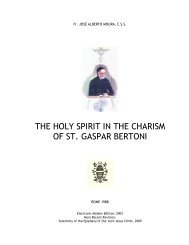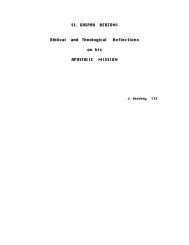[B.] St. IGNATIUS of LOYOLA Presentation: The ... - St. Gaspar Bertoni
[B.] St. IGNATIUS of LOYOLA Presentation: The ... - St. Gaspar Bertoni
[B.] St. IGNATIUS of LOYOLA Presentation: The ... - St. Gaspar Bertoni
Create successful ePaper yourself
Turn your PDF publications into a flip-book with our unique Google optimized e-Paper software.
INTEGRE;SJ-OFM<br />
= 31 =<br />
perpetually by vow that he did not wish ever again to deny anything that was asked <strong>of</strong> him for<br />
God.<br />
1817: And it became his custom that when he would even hear mentioned the love <strong>of</strong> God, or<br />
heard about the deeds and he sufferings <strong>of</strong> Jesus Christ, he would first feel himself shaken to the<br />
core, and this would move him to wish for the most ardent imitation <strong>of</strong> Him.<br />
And how great was his temperance, his modesty, his innocence, that he sought no<br />
pleasures, or comforts, in conversations, and took part in no abuses Even his innermost desires,<br />
were they ever anything but the most innocent As a young man, did he not remain gentle,<br />
loving, and even among his rather vain companions, and those immersed in vanities, in such a<br />
licentious age Did he not consider every type <strong>of</strong> vice to be the most despicable and<br />
abominable<br />
And was not his humility great, his meekness, and were these not the adornment <strong>of</strong> his<br />
most beautiful conduct And was not his detachment most generous in the face <strong>of</strong> riches<br />
1818: He managed all this while he was still being occupied in worldly affairs, and had not yet<br />
understood well the secret <strong>of</strong> his vocation. What would he do then, once he would come to<br />
understand it What did he do Hardly had he heard the voice <strong>of</strong> the Master <strong>of</strong> Perfection,<br />
Jesus, Who led him to know that to perfectly decline from the concupiscence <strong>of</strong> the eyes, or<br />
avarice, He counsels all to the renunciation <strong>of</strong> temporal goods [ If you wish to be perfect, go,<br />
sell,… and so on - Mt 19:21 - Blessed are the poor in spirit Mt 5:3]. This moved the saint to<br />
sell what was his, since he was quite wealthy, and to cast it all away from himself, if not always<br />
through generosity, but with disdain, with a feeling <strong>of</strong> its abomination, to seek Christ alone. I<br />
count all these things to be but loss…that I may gain Christ [Ph3:8].<br />
1819: What would he do He would despoil himself even <strong>of</strong> his clothing, as well as the right <strong>of</strong><br />
being the heir to his own father. He even took <strong>of</strong>f the clothing that covered him in the presence <strong>of</strong><br />
the Bishop in order to follow the nude Christ, stripped on His Cross. <strong>The</strong>n there was seen the<br />
very harsh hair-shirt on the flesh <strong>of</strong> Francis.<br />
What would he do once he would hear Christ Who taught that in order to decline perfectly<br />
from the concupiscence <strong>of</strong> the flesh, not only to remove every such experience, but even to<br />
extinguish any desire <strong>of</strong> pleasure, even those licit ones, with a voluntary grief and mortification<br />
It was enough for him to hear the message <strong>of</strong> Christ: He that can take, let him take it Mt 19:12.<br />
Blessed are they who mourn Mt 5:5. Thus one would see Francis with such scarce meals, so<br />
much so that it seemed impossible that he could hold his life together with so little. This was<br />
furthermore sprinkled with ashes to remove taste from it, and he would pour icy water over the<br />
heated vegetables. During his illness, however, he would consume the cooked food, but only in<br />
the more acute phases <strong>of</strong> his sickness.. Yet, his fasts were perpetual, that were even more<br />
intense in the six Lents, but were never interrupted.<br />
1820: He traveled and did not bring food for the journey; when he would lodge somewhere, he<br />
did not accept any human care whatsoever. He slept very little: his bed was the naked earth, his<br />
pillow a stone, or a piece <strong>of</strong> wood: and this was his situation after having worked hard in<br />
preaching. Otherwise, he took his rest almost in haste, either standing up or while seated. His<br />
dwelling places were either the horrible caves, or poor stables.<br />
He wore rough clothing, even intentionally made more uncomfortable. <strong>The</strong>se allowed his<br />
flesh to experience everything from the heat, as well as from the cold, and the greater discomforts<br />
<strong>of</strong> the seasons. His flesh was tormented by coarse hair-shirts, by harsh flagellation, that much<br />
blood flowed out from his veins. Under this punishment a number <strong>of</strong> times, he fell to the ground,<br />
conquered as it were by the excessive suffering <strong>of</strong> his body. And not content with the arms used<br />
to combat this, nor even being satisfied with some victories, he continued to have thorns, ice,<br />
flames, fire, to serve as his instruments for his final victory. Not even after his victories would he


![[B.] St. IGNATIUS of LOYOLA Presentation: The ... - St. Gaspar Bertoni](https://img.yumpu.com/33393889/31/500x640/b-st-ignatius-of-loyola-presentation-the-st-gaspar-bertoni.jpg)
